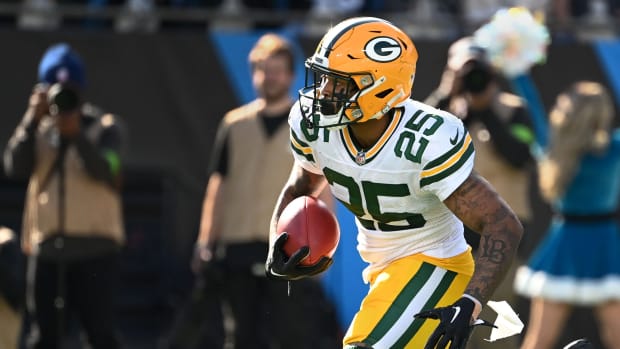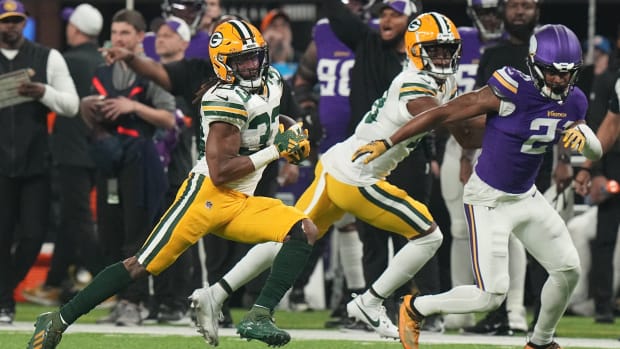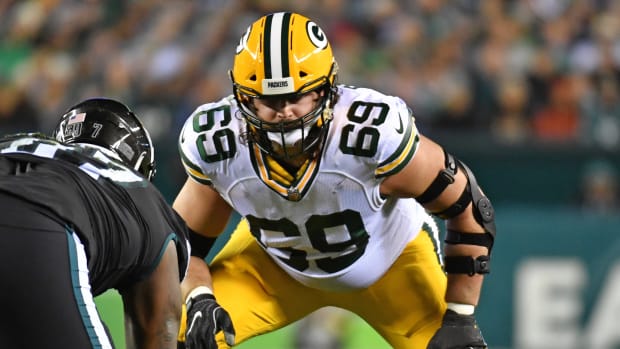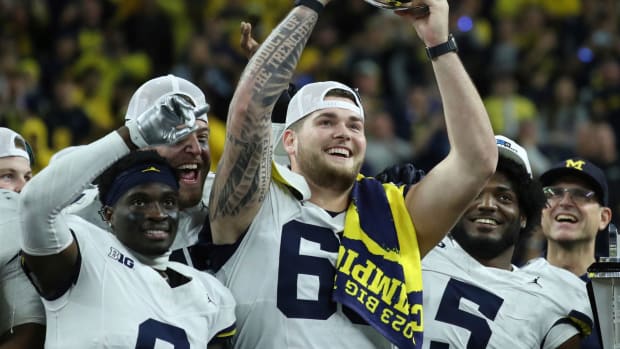Here’s Why Rodgers’ Contract Uncertainty Matters
Note: This commentary was written on Wednesday, March 31. The embedded tweet below is from Saturday, April 3.
GREEN BAY, Wis. – The Green Bay Packers’ decision to not restructure or extend quarterback Aaron Rodgers’ contract could mean nothing at all.
Or it could mean everything.
Just because the Packers haven’t touched Rodgers’ contract doesn’t mean they won’t. NFL Network’s Mike Silver reported the two sides have negotiated but the nature of those talks is unknown. Sources have been incredibly tight-lipped about the state of negotiations.
While one window has passed, with the Packers paying a $6.8 million roster bonus, Rodgers’ $14.7 million salary could be cut to the league minimum of $1.075 million, with the difference turned into signing bonus that would create $9.085 million of cap space for the 2021 season at the expense of higher cap charges in 2022 and 2023.
With Rodgers under contract through 2023, his contract should be a nonissue. The extension he signed before the 2018 season has him ranked fifth among quarterbacks in terms of average salary.
Instead, two factors make Rodgers’ contract a real issue. First, the selection of Jordan Love with a first-round pick last year threw Rodgers’ future with the team that drafted him in 2005 into limbo. Second, the impact of COVID-19 means the salary cap is down $15.7 million compared to last year. The Packers have been turning over practically every stone in hopes of finding relief. The only stone that hasn’t been flipped is the one wearing the No. 12 jersey.
And that’s where the lack of action could mean everything.
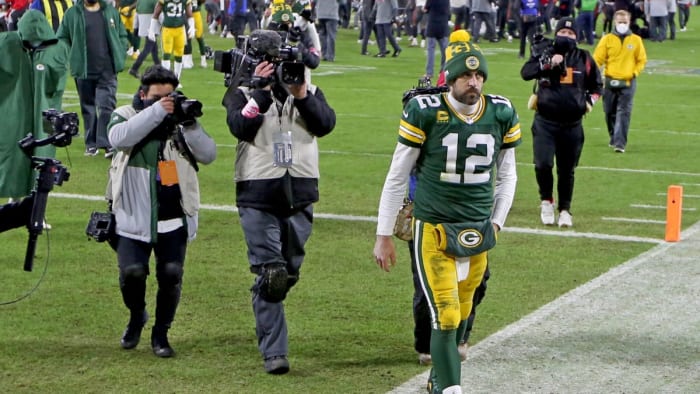
Aaron Rodgers walks off the field following the Green Bay Packers' loss to the Tampa Bay Buccaneers in the NFC Championship Game. For how many more season will Rodgers be the quarterback. (Image: Mike De Sisti/USA TODAY Sports)
“We’ve been able to create room with others,” Packers President/CEO Mark Murphy told reporters via a Zoom on Tuesday night.
He is right about that. The Packers went from significantly over the salary cap to having enough space to re-sign Pro Bowl running back Aaron Jones and cornerback Kevin King without touching the quarterback’s contract. Given Rodgers is 37, there’s some logic to that approach.
However, Rodgers is the obvious reason why the Packers won the Super Bowl in 2010 and reached four other NFC Championship Games the past decade. Rodgers is the main reason why the Packers have won despite some bad drafts. Rodgers is the main reason why Matt LaFleur is 26-6 in his two seasons as coach.
Rodgers’ success has made him the face of the franchise. He is not entitled to be the face of the franchise forever. But he is entitled to know where he stands.
That’s why Rodgers’ contract is a real issue and not just easy clickbait headlines or drivel for the talking heads to shout about. The lack of action on a restructure, which would provide the team needed cap relief while showing Rodgers that he indeed is the quarterback for the long haul, stands in stark contrast to general manager Brian Gutekunst’s strong comments from the end of the season.
“We’re really excited not only for next year but the years to come,” Gutekunst said. “He’s playing at such a high level that he always has, and I think this year was a special team. It didn’t finish like we wanted to finish, but I think everybody’s purely motivated to get back. I don’t think there’s anything that we have to do (to assure him of his future). He’s our quarterback and he’s our leader.”
Later, he added: “I think that he is arguably the best player that I’ve ever seen or been around. The chances he gives us week in and week out are significant, so he’s going to be part of our future and we look forward to all the runs we’re going to try to make here over the next few years.”
Words are words but money talks. That doesn’t mean more money but the structure of that money.
Led by Gutekunst, the Packers created about $31.6 million of cap space by restructuring contracts for All-Pro left tackle David Bakhtiari, Pro Bowl outside linebacker Za’Darius Smith, fellow outside linebacker Preston Smith, versatile offensive lineman Billy Turner, steady safety Adrian Amos and kicker Mason Crosby. Vast amounts of money for Bakhtiari and Za’Darius Smith were shifted into the future. Void years were added to the contracts of Turner, Amos and Crosby.
The Packers could have avoided some of that silliness by restructuring Rodgers (to give him certainty about where he stands), Preston Smith (to avoid the massive dead-money charge of releasing him after a subpar season) and Bakhtiari (an elite player who’s only 29). A max restructure of Rodgers and the exact restructures given to Smith and Bakhtiari would have created $29.2 million. A more manageable roster bonus-to-signing bonus for Za’Darius Smith would have created $2.5 million, bringing the total to $31.7 million.
Instead, a massive restructure means Za’Darius Smith will count $28.1 million against the 2022 cap. A contract extension will ease that sting, but that means paying big money to Smith in 2023, when he’s 30, and, presumably, beyond. The void years for Turner, Amos and Crosby mean they’ll count against the cap even when no longer on the team.
All of which begs the question: Why not restructure Rodgers, who was brilliant in 2021 and plays a position in which players can deliver high-level performances into their 40s, and what does that mean about his future?
“I’m not going to get into any individual player or any issues along those lines,” Murphy said, his third tepid response toward the three-time MVP quarterback.
The Packers could have used the quarterback’s contract to get to where they are cap-wise and made it clear that the upcoming season isn’t going to be a farewell tour filled with distractions.
The reality, however, is nothing has changed since Love was selected 11 months ago or even since the end of the season, when Rodgers wondered aloud about his future with the team.
Before the NFC Championship Game, he called his future a “beautiful mystery.” After the game, a bitter 31-26 loss, he said, “A lot of guys’ futures that are uncertain – myself included.”
That uncertainty remains. As was the case on draft night, everything is lined up for the Packers to release/trade Rodgers after the 2021 season and hand the team to Love. With Rodgers’ contract untouched, they’d create $22.6 million of cap space by parting ways with their legendary quarterback. That, in turn, would give Love a full season as the starter in 2022 and allow the team to make an informed decision about activating his fifth-year option, which must be done after his third season.
From Rodgers’ perspective, shifting money from 2021 to 2022 and 2023 would make it more likely that he starts and finishes his career with the Packers – his long-stated desire. Moreover, it would provide money to add to a championship-caliber roster, though the wave of restructures already have the Packers in a deep financial hole for 2022.
From Gutekunst’s perspective, he appears to be walking a pair of tightropes. One, he wants to win now but not cripple the team’s financial future by restructuring too many contracts. Two, it seems as if he’s leaving his options open by not committing to either of his quarterbacks. By now, he should have a decent feel for Love’s future but he’ll know a lot more by the end of this summer, when Love has an offseason program, training camp and three preseason games. If Love takes sizable steps in the right direction in training camp, then the awkward wheels of transition can roll behind the scenes. If not, then Gutekunst has Rodgers under contract for 2022 and 2023.
Here’s the thing, though. Rodgers doesn’t want to be the team’s backup plan. The reigning MVP and one of the greatest players in NFL history deserves better than that.

